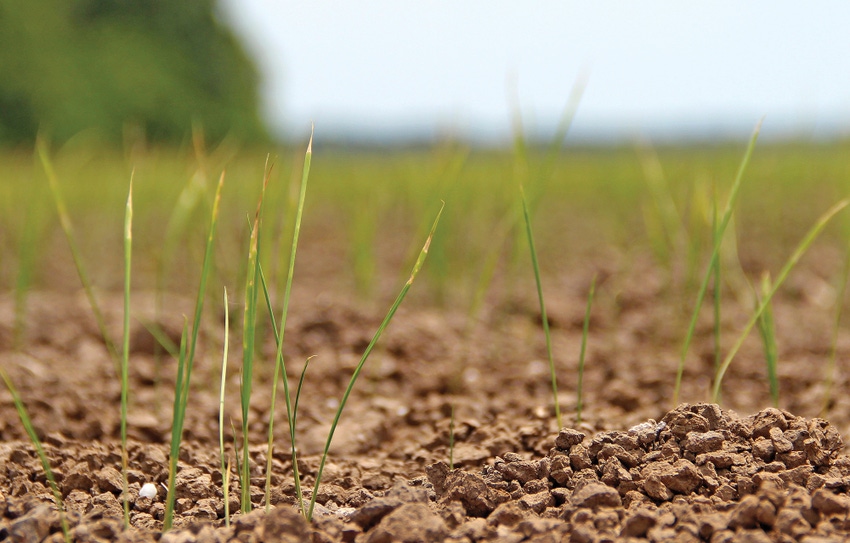
Rice planting was off to a roaring standstill for much of the Mid-South in early April as wet weather and cold temperatures slowed progress considerably. Here’s more from state rice specialists and agronomists:
Louisiana
According to Johnny Saichuk, Extension rice specialist, the state was about 60 percent planted in south Louisiana by the end of the first week in April, but barely started in northeast Louisiana. “This has been a season of slow motion. We’re just crawling along, not getting a lot done.”
Saichuk says rains “have been just frequent enough to keep farmers out of the field and just cold enough to keep the crop from progressing. The worst thing for us right now is cloud cover. We’re just not getting the hours of sunlight that we need.”
There’s no need to hit the panic button in south Louisiana just yet, according to Saichuk, although northeast Louisiana was significantly behind in planting progress in early April. Plus plenty of sunshine was in the forecast for the weeks ahead.
In response to higher prices, Louisiana producers are planting a lot more medium grain rice spring, Saichuk said. “There is a whole lot more interest in medium grain than we’ve had in many years. If we get up over 10 percent to 15 percent in medium grain plantings, that’s a big medium grain crop.”
Mississippi
Mississippi rice producers simply didn’t had a lot of days suitable for planting in late March and early April, noted Lee Atwill, research associate for the rice research program at the Delta Research and Extension Center in Stoneville.
“Some rice was planted in the past couple of weeks, but it’s been so wet. Here at the research station, we have a very small percentage of our research plots planted, around 5 percent. We have six off-station locations on farms, and we’ve only planted one of those so far.”
Typically at this time of the year, planters would be rolling statewide. “If any rice has been planted, it’s been on lighter textured soils. Our clay soils have not dried out near enough yet to get any planting done.”
Atwill has observed a lot of acreage under water from Tunica to the research station. “The ditches were full, so it’s not draining off quickly either. I suspect that if we get nice weather later in this week, there may be rice going in on the lighter textured soils.”
Southeast Missouri
Sam Atwell, agronomy specialist for rice in Butler County says very little rice planting has occurred in the state. “It’s just been cold. Most of the fields have been burned down, most look perfect, ready to plant. We’re in fine shape, but things just need to warm up a little bit.”
Atwell expects rice acreage to rise in the Bootheel this year, to as much as 180,000 acres, compared to 150,000 acres last year. “The farmers I talked to this week are sitting on ready. Just as soon as it warms up, hopefully the latter part of this week, they’ll plant a lot, and it will go fast.”
Growers are showing an interest in medium grain rice in the Bootheel, too, Atwell said. “Everybody’s keeping an eye on California. If they cut them out of medium grain acres because of water shortages, there is a market there.”
Arkansas
Jarrod Hardke, Extension rice agronomist for Arkansas, said rice planting “has been very slow at this point, to say the least. I think we’re about 5 percent planted at this point. Most of that is isolated around hot spots in the central portion of the state.”
Ag news delivered daily to your inbox: Subscribe to Delta Farm Press Daily.
Hardke said some producers took advantage of warm weather and dry fields to plant rice as early as March 10 this year. “These were not isolated to the very southern end of the state. A lot of that happened farther up the Delta too.”
As a general rule, Arkansas rice planting begins around March 15 in the southern part of the state, March 22 up to I-40 and late March to April 1 for the northernmost of the state’s rice acreage.
Had dry weather prevailed the last few weeks, the state would likely have been as much as 25 percent to 30 percent planted by the first week in April. “But it’s not, and they’re calling for more rain tomorrow,” Hardke said.
Check Rough Rice Futures Prices
Hardke doesn’t believe the delays will end up reducing rice acres. “Everybody wants to get rolling now. We were really hoping that today, April 7, would have been a nice dry, warm sunny day. Instead we had anywhere from 1 inch to 3 inches of rain, in some cases a lot more than that.”
Hardke said 10 years ago, planting rice in late April was considered an early planting. “But the culture has changed, and farmers had have begun to see what their yields can do if they plant earlier than that. The proof has been in the research and the results. If you can get it in and get it up, the yields are higher.
“Most all of our information says that that a late March to very early April planting window is when your highest grain yield is going to occur. It’s a gradual trend downward in yield from there until early June, where you get a 20 percent to 25 percent yield reduction.”
Hardke said Arkansas producers will also increase medium grain rice acres, but those acres will probably likely cap out below 200,000 acres because of seed availability.
“The state has been at 200,000 acres of medium grain rice before, but not in the last five or six years. There’s really no reason for the seed supply to be there to support a jump to 200,000 acres.”
About the Author(s)
You May Also Like






